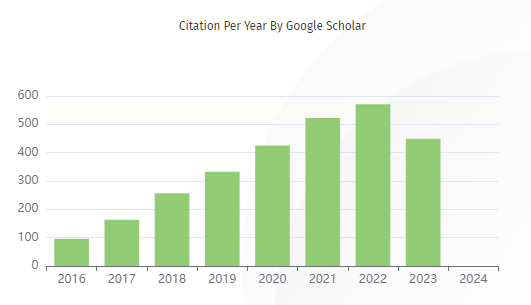Determinan Intensitas Transaksi Afiliasi pada Perusahaan-perusahaan dalam Grup Bisnis di Bursa Efek Indonesia
DOI:
https://doi.org/10.12695/jmt.2016.15.2.2Keywords:
related party transaction, business group, ultimate shareholder, good corporate governance, debt to equity ratio.Abstract
Abstrak. Transaksi afiliasi merupakan aksi korporasi penting dengan tingkat kejadian tertinggi dari seluruh aksi korporasi emiten yang terdaftar di Bursa Efek Indonesia. Intensitas transaksi afiliasi memungkinkan ekspropriasi hak pemegang saham minoritas serta berpengaruh terhadap nilai perusahaan. Penelitian ini bertujuan menganalisis determinan-determinan yang mempengaruhi intensitas transaksi afiliasi pada perusahaan dalam grup bisnis di Bursa Efek Indonesia. Determinan tersebut adalah kepemilikan saham ultimat, tata kelola perusahaan yang baik (dengan komisaris independen dan kantor akuntan publik Big Four sebagai proxy), rasio utang terhadap modal serta periode krisis. Penelitian ini menggunakan data panel dengan periode waktu kuartalan dari 2006 sampai 2013. Sampel ditentukan dengan cara purposive sampling yang berfokus kepada tipologi perusahaan yaitu perusahaan yang tergabung dalam tiga grup bisnis mewakili tiga lapisan kapitalisasi pasar. Hasil menunjukkan bahwa kepemilikan saham ultimat secara tidak signifikan berpengaruh positif terhadap intensitas transaksi afiliasi. Komisaris independen dan rasio utang terhadap modal secara signifikan berpengaruh positif terhadap intensitas transaksi afiliasi. Kantor akuntan publik Big Four secara signifikan berpengaruh negatif terhadap intensitas transaksi afiliasi. Periode krisis secara tidak signifikan berpengaruh negatif terhadap intensitas transaksi afiliasi. Determinan-determinan tersebut secara keseluruhan berpengaruh terhadap intensitas transaksi afiliasi.
Keywords: transaksi afiliasi, grup bisnis, pemegang saham ultimat, tata kelola perusahaan yang baik, rasio utang terhadap modal.
Â
Abstract. Related party transactions are important corporate actions with the highest incidence rate of all issuers’ corporate actions listed in the Indonesia Stock Exchange. Related party transactions' intensity allows minority  holders' expropriation right and affects company's value. This study aimed to analyze the determinants affecting related party transactions’ intensity in companies in the business groups in the Indonesia Stock Exchange. The determinants were ultimate shareholders, good corporate governance (with independent commissioner and the Big Four public accounting firms as proxies), debt to equity ratio, and period of crisis. This study used panel data with quarterly time period from 2006 to 2013. Samples were determined by purposive sampling focusing on companies’ typology, namely companies in the three business groups representing the market capitalization’s three layers. The results showed that ultimate shareholders insignificantly had positive effect on related party transactions’ intensity. Independent commisioners and debt to equity ratio significantly had positive effect on related party transactions’ intensity. The Big Four public accounting firms significantly had negative effect on related party transactions’ intensity. Period of crisis insignificantly had negative effect on related party transactions’ intensity. The determinants as a whole have an effect on the intensity of related party transactions.
Keywords: related party transaction, business group, ultimate shareholder, good corporate governance, debt to equity ratio.
Downloads
References
Berita Satu. (2015). 5 Grup emiten kuasai "Market Cap" bursa. Tersedia pada www.beritasatu.com. [diunduh 7 April 2015].
Bertrand, M., Mehta, P., & Mullainathan, S. (2002). Ferreting out tunneling: an application to Indian Business Groups. The Quarterly Journal of Economics, 117, 121-148.
Bodie, Z., Kane, A., & Marcus, A.J. (2014). Investments (10th ed). New York : Mc Graw Hill Education.
Bursa Efek Indonesia. (2015). Profil perusahaan tercatat. Tersedia pada www.idx.co.id. [diunduh 15 Maret 2015].
Bianchi, M., Ciavarella, A., Novembre, V., & Signoretti R. (2010). Comply or explain? investor protection through corporate governance codes. European Corporate Governance Institute (ECGI) Working Paper Series in Finance, 278.
Chaghadari, M.F., & Shukor, Z.A. (2011). Corporate governance and disclosure of related party transactions. Proceeding of 2nd International Conference on Business and Economic Research (2nd ICBER 2011).
Cheung, L.C., Rau, P.R., & Stouraitis, A. (2006). Tunneling, propping, and expropriation: evidence from connected party transactions in Hong Kong. The Journal of Financial Economics, 82 (2006), 343-386.
Claessens, S., Djankov, S., & Lang H.P. (2000). The Separation of ownership and control in east asian corporations. Journal of Financial Economics, 58 (1–2), 81–111.
Dow, S., & McGuire, J. (2009). Propping and tunneling: empirical evidence from japanese keiretsu. Journal of Banking and Finance, 33 (2009), 1817-1828.
Firdaus, M. (2011). Aplikasi ekonnometrika untuk data panel dan time series. Bogor : IPB Press.
Gordon, E.A., Henry, E., & Palia, D. (2004). Related party transactions: associations with corporate governance and firm value. Advances in Financial Economics, 9, 1-27.
Ho, S.S.M., & Wong, K.S. (2001). A Study of the relationship between corporate governance structures and the extent of voluntary disclosure. Journal of International Accounting, Auditing & Taxation, 10 (2001), 139-156.
Hsiao, C. (2003). Analysis of panel data. (2nd ed). Cambridge: Cambridge University Press.
[IAI] Ikatan Akuntan Indonesia. (2012). Standar Akuntansi Keuangan per Juni 2012. Jakarta : IAI.
[IASB] International Accounting Standards Boards. (2010). International financial reporting standards Part A, A589. London : IFRS.
Investasi-Kontan. (2013). 19 Emiten masuk pengawasan OJK. Tersedia pada www.investasi.kontan.co.id. [diunduh 27 Oktober 2014].
Jensen, M.C., & Meckling, W.H. (1976). Theory of the firm: managerial behavior, agency costs and ownership Structure. Journal of Financial Economics, 3, 305-360.
Judge, G.G., Griffiths, W.E., Hill, R.A., Lutkepohl, H., & Lee, T.C. (1985). The theory and practice of econometrics. (2nd ed). New York : John Wiley & Sons, Inc.
[KEMENKEU] Kementerian Keuangan Republik Indonesia. (2015). Peraturan Menteri Keuangan Republik Indonesia Nomor 169/PMK.010/2015 tanggal 9 September 2015 tentang Penentuan Besarnya Perbandingan antara Utang dan Modal Perusahaan untuk Keperluan Penghitungan Pajak Penghasilan. Tersedia pada www.jdih.kemenkeu.go.id. [diunduh 30 Maret 2016].
[KNKG] Komite Nasional Kebijakan Governance. (2006). Pedoman umum good corporate governance Indonesia. Jakarta : KNKG.
La Porta R., Lopez-De-Silanes, F., & Shleifer, A. (1999). Corporate ownership around the world. Journal of Finance, 54 (2), 471–517.
Liew, C.Y., Samad, M.F., & Munir, S.H. (2011). Expropriation-related variables & firm performance: evidence from Malaysian family firms. Social Science Research Network, 1-66.
Lo, A.S.Y., Wong, R.M.K., & Firth, M. (2010). Tax, financial reporting, and tunneling incentives for income shifting: an empirical analysis of the transfer pricing behavior of chinese-listed companies. American Accounting Association, 32 (2), 1-26.
Mitton, T. (2002). A Cross-firm analysis of the impact of corporate governance on the east asia financial crisis. Journal of Financial Economics, 64, 215-41.
Morck, R., Shleifer, A., & Vishny, R.W. (1988). Management ownership and market valuation: an empirical analysis. Journal of Financial Economics, 20, 293-315.
Nachrowi, N.D., & Usman, H. (2006). Pendekatan populer dan praktis ekonometrika. untuk analisis ekonomi dan keuangan. Jakarta: Lembaga Penerbit Fakultas Ekonomi Universitas Indonesia.
Nekhili, M., & Cherif, M. (2011). Related parties transactions and firm's market value: the French case. Review of Accounting and Finance, 10 (3), 291-315.
[OECD] Organisation for Economic Co-operation and Development. (2012). Thin capitalisation legislation. Tersedia pada www. oecd.org. [diunduh 28 Februari 2015].
[OECD] Organisation for Economic Co-operation and Development. (2003). Glossary of statistical terms. Tersedia pada www.stats.oecd.org. [diunduh 28 Februari 2015].
[OJK] Otoritas Jasa Keuangan. (2009). Keputusan Ketua Badan Pengawas Pasar Modal dan Lembaga Keuangan Nomor : KEP-412/BL/2009 tanggal 25 Nopember 2009 tentang Transaksi Afiliasi dan Benturan Kepentingan Transaksi Tertentu. Tersedia pada www.ojk.go.id. [diunduh 28 Februari 2015].
[OJK] Otoritas Jasa Keuangan. (2012). Siaran pers akhir tahun 2012. Tersedia pada www.ojk.go.id. [diunduh 28 Februari 2015].
[OJK] Otoritas Jasa Keuangan. (2013). Laporan tahunan OJK 2013. Tersedia pada www.ojk.go.id. [diunduh 15 Maret 2015].
[OJK] Otoritas Jasa Keuangan. (2014). Konperensi pers akhir tahun 2014. Tersedia pada www.ojk.go.id. [diunduh 15 Maret 2015].
Pizzo, M. (2012). Related-party transactions in corporate governance. Journal of Management and Governance, 1-30.
Riyanto, Y.E., & Toolsema, L.A. (2008). Tunneling and propping: A justification for pyramidal ownership. Journal of Banking and Finance, 32 (2008), 2178-2187.
Tobin, J. (1969). A General equilibrium approach to monetary theory. Journal of Money, Credit and Banking, 1 (1), 15-29.
Williamson, O.E. (1975). Markets and Hierarchies: analysis and antitrust implications: a study in the economics of internal organization. New York : The Free Press.
Yeh, Y.H., Shu, P.G., & Su, Y.H. (2012). Related-party transactions and corporate governance : the evidence from the taiwan stock market. Pacific-Basin Finance Journal, 20 (2012),755-776.
Zhu, Z. (2009). Multiple principal-agent relationships, corporate-control mechanisms and expropriation through related party transactions: evidence from China. International Research Journal of Finance and Economics, 31.
Downloads
Submitted
Accepted
Published
How to Cite
Issue
Section
License

This work is licensed under a Creative Commons Attribution-NonCommercial-ShareAlike 4.0 International License. Copyright @2023. This is an open-access article distributed under the terms of the Creative Commons Attribution-NonCommercial-ShareAlike 4.0 International License (http://creativecommons.org/licenses/by-nc-sa/4.0/) which permits unrestricted non-commercial used, distribution and reproduction in any medium.

















